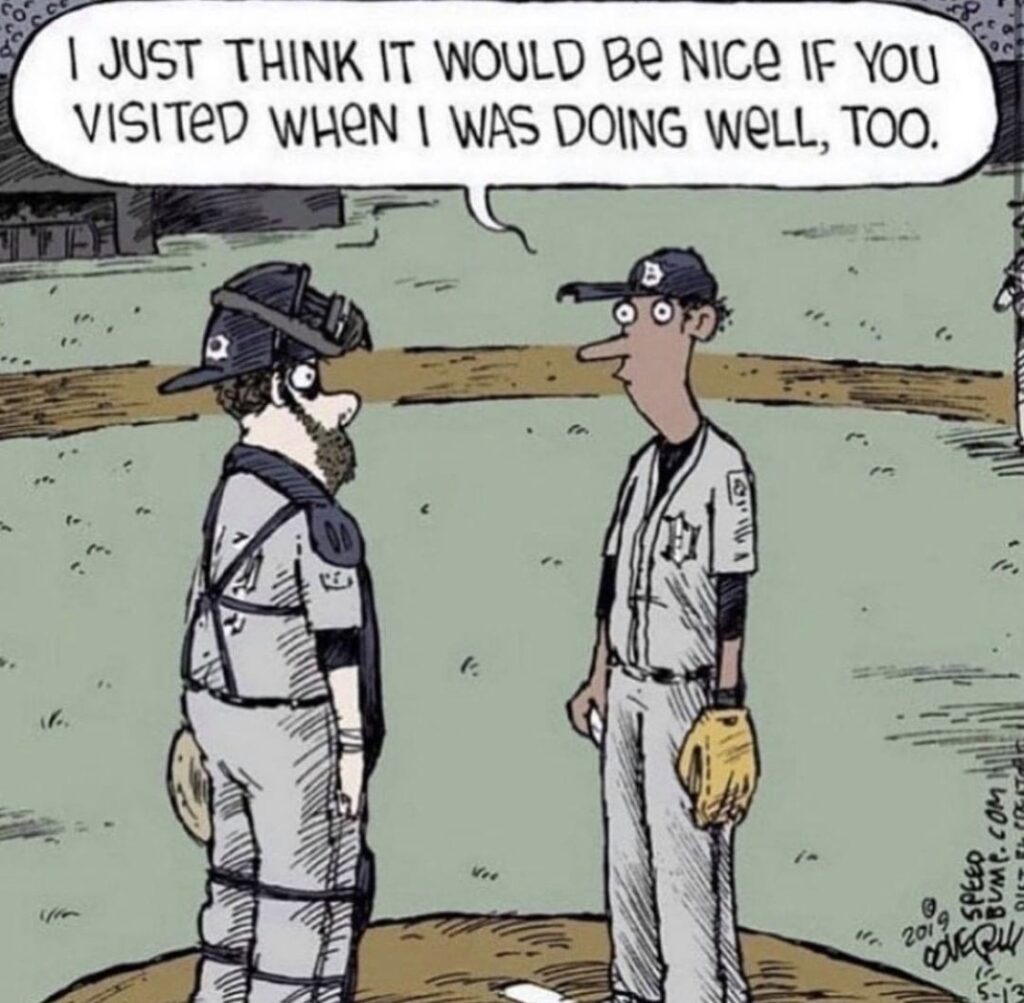Have you ever thought about the impact of a leader’s volume of praise versus criticism? Praise too often and it loses impact, but if you only correct mistakes, teams will lose motivation and operate too tightly.
I played on a travel baseball team in high school that illustrated the latter point. I was the team’s catcher, and we were playing a second game on steamy July day.
My pitcher did not have his best stuff that day. I must have blocked 20 balls in the dirt through the first few innings, often diving inside and outside to keep the many runners he walked from scoring.
Now, my job as a catcher is to keep the ball in front of me. When I blocked a ball, I wasn’t expecting my team to stand up and cheer any more than our pitcher expected applause when he threw a strike.
But deep into this second game, my legs were jelly, and I was gassed. On a steal attempt, I bounced a ball toward second base that ended up in centerfield, and the runner advanced to third base.
And immediately from the dugout, our manager didn’t miss a beat, “What are you doing, Mathews? That throw just cost us a run!”
No shit, coach.
It might not surprise you that this team had a losing record that summer. That coach only saw the mistakes and made sure that everyone on the team knew that he saw them.
But what if I told you that this travel team was comprised mainly of kids who would go on to win a state championship at the varsity level just two years later?
Play To Win Or Not To Screw Up?
Let’s look at why that group of talented baseball players wasn’t functioning well as a team.
This coach rarely recognized effort, hustle, or positive outcomes. You might hit a double into the gap, and he’s yelling at the runner on third base for getting a late jump.
Even though we had played together for years, the team dynamic was off that summer. Our manager’s potential wrath dictated our every move.
Rather than playing loose and having fun, every move was predicated on not making mistakes. We all wanted to impress since this team fed into the Varsity squad.
I wrote about the reasons that teams hide bad news from the manager, and this was a textbook case. How a leader responds to failure is largely what constitutes a company’s culture.
Rather than pick each other up and fill in the void of encouragement left by the manager, we secretly hoped that teammates would make mistakes before we did.

There is a fantastic scene in the movie, “Searching For Bobby Fischer,” where a chess prodigy’s mother and father argue over the demanding nature of their son’s routine.
“How many ballplayers grow up afraid of losing their father’s love every time they come to the plate?”
“All of them!”
But does any of this translate to business?
The Praise-To-Criticism Ratio
Emily Heaphy and Marcial Losada researched the ratio of praise-to-criticism in 60 business units within one large company. These teams were separated into three objective categories: High-performing, Average, Low-performing.
“Effectiveness” was measured according to financial performance, customer satisfaction ratings, and 360-degree assessments by individual team members.
The factor that made the greatest difference between the most and least successful teams, Heaphy and Losada found, was the ratio of positive comments to negative comments.
This was the ratio of praise-to-criticism in each cohort:
High-performing: 5:1
Average: 2:1
Low-performing: 1:3
So the obvious takeaway is that managers should err on the side of praise over criticism. But I doubt you needed a controlled experiment to learn that lesson.
Praise, But With Sincerity
Notice that even the high-performing teams offer constructive criticism. The low-performing teams would not turn around simply by eliminating the negative feedback and ramping up their use of “Great job!” tenfold.
First off, encouragement is only effective when it is specific and earned.
If my wife writes me a hand-written thank you card for putting the toilet seat down, I understand the “golf clap” nature of her sincerity. It feels the same if my boss says “great job!” to everyone for even the most basic tasks.

Positive feedback is best when an effort truly stands out from the norm. Some examples might include:
- A new employee doing something for the first time.
- A private teammate offering to mentor someone.
- Someone working through the weekend to meet a customer deadline.
I like to use praise as a tool for reinforcing someone’s strengths. It is easier to see the link between someone else’s behavior and their results than explain our own effectiveness. Ask someone skilled at customer service how they do it, and most will shrug because their behaviors are largely automatic.
Help them see those positive behaviors with something like, “You do an exceptional job of disarming an upset customer by responding with open-ended questions. I was blown away by how you handled Mr. McGillicutty.”
This specific and timely feedback reinforces unusual behavior that you want to see more of, “Yes! That!”
Finding An Ideal Balance Of Praise Versus Criticism
Notice that the study referenced above did include negative feedback. A leader who never has constructive feedback is not doing their team any favors.
A little bit of negative feedback goes a long way for several reasons:
- It lets your team know that you are paying attention. An overly rosy manager can send an impression to their team that they are disconnected from the business.
- Constructive criticism grabs someone’s attention. Think of it like your mom grabbing you by the ear when you did something wrong as a kid. Candid criticism is great at waking us up to a behavior that needs to change.
- Certain negative feedback guards against complacency and groupthink. Teams will settle into the status quo if not urged to improve by some external stimulus.
But significant research shows that lasting relationships are based on a positive-to-negative ratio heavily favoring encouragement. Take the research done by John Gottman on married couples as another example.
Gottman was intensely curious about the determining factors that led to married couples remaining married or getting divorced. Like Heapley and Losada’s research, he found that the single biggest determinant was the ratio of positive to negative comments married couples make to each other.

And the optimal ratio is amazingly similar—five positive comments for every negative one. For those who ended up divorced, the ratio was 0.77 to 1—or something like three positive comments for every four negative ones.
Pattern Interrupters
People focus attention on outliers. Anything that breaks a pattern gets our attention. So we are more likely to call out a mistake than notice a long string of successful outcomes.
This is annoying as an employee.
Most trends are positive in business. When we give someone a job to do, most do it well 90% of the time. So that becomes an accepted pattern subconsciously. Those hundreds of “good deeds” become invisible to us.
But the 10% break our pattern and get our attention. The brain doesn’t like things that don’t fit into narratives, so we rush to correct the mistake every time.
In a previous business, I read every customer survey on Monday mornings. We typically received 100+ surveys, with 80% scoring us a perfect 10 out of 10. On any random day, I might glance past one salesperson who received ten perfect scores and say nothing.
Why?
Because I was so fixated on the one customer who wrote three paragraphs of scathingly bad feedback. But this customer’s experience was no more or less valuable than all of the happy customers, but my response certainly was.
I jumped into root-cause analysis mode, talked with the local office, and attempted to understand how this might be an isolated incident and not the beginning of a trend. Appropriate? Sure, you can’t run a business without being curious about miserable customers.
But what did my direct reports expect to hear every Monday when I called them after reading the report? I was Lumberg calling about the TPS reports.

But the lesson here is to spend time praising your customer service stars who routinely show up on that report as having done their job tremendously. I often made the mistake of donating all of my time to the few who didn’t get it and ignoring my top performers.
Chicken or Egg?
One might see this data from two different perspectives:
1. High-performing businesses hire better people who deliver more successful outcomes and fewer errors. The criticism-to-praise ratio is higher because there is more to praise and less to criticize.
2. Low-performing businesses hire managers who overly focus on negative outcomes, creating a defeated workforce with high employee turnover. Those teams never reach their potential because of the environment set by the leadership team.
There is likely some truth in both of those assumptions. High-performing companies hire better talent, but they also keep that talent with balanced feedback that skews positive, leading to a light environment where people work without walking on eggshells.
So what changed with my losing travel baseball team that developed into a powerhouse just two years later? Our coach.
Before our senior season, he pulled us together and told us it was now our team. He planned to pull back on the controls and let us lead from the field. It is one thing for a coach to say this, but he lived up to it.
Gone were the days of barking after every error, misthrow, and mental mistake. That silence led to our leaders filling the void, and we did it mostly with encouragement. We knew when we made mistakes, and he stopped reminding us incessantly.
That team thrived only when our manager reversed his ratio of praise versus criticism.
Are you interested in similar content on leadership, management, and careers? Receive articles and updates like this directly to your email.
We value your privacy and will never spam you.
